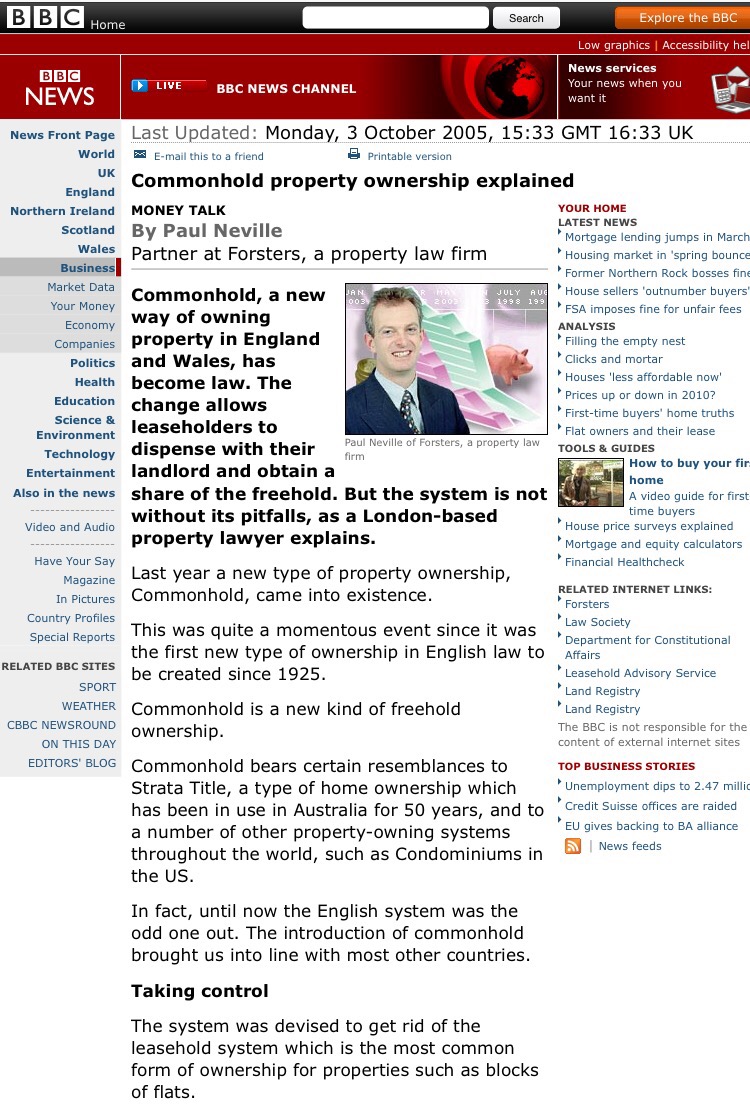I recently wrote a short piece on the Housing White Paper that appeared on my other site, Leasehold Reform News.
Whilst the forthcoming election may well throw some of the government policy objectives into uncertainty in the short term, I thought it was worth posting it here. The Housing White Paper does have a few paragraphs addressing leasehold – in particular the increasingly vocal issues surrounding leasehold houses and the question of ground rents that escalate. This issue is becoming increasingly topical. In the paragraphs below I address some of the proposed solutions and look at how these might work in practice from a technical point of view.
You can read or download the full Housing White Paper.

Are we really going to be Fixing our Broken Housing Market ?
My thoughts on the main themes affecting long leasehold appear below (the details of the exact paragraphs in the consultation appear in my earlier post).
New leasehold houses and ground rents –
Stopping increasing and onerous payments on leasehold houses
How will this be achieved in practice? Banning the creation of all leasehold houses probably won’t work as this wouldn’t help cover situations with ‘overlap’ or ‘undercut’ with adjoining property.
Perhaps leasehold ‘houses’ could be deemed to be ‘flats’ (in the legal sense) that just happen to look like houses. That would then allow the service charge legislation to apply.
There could perhaps then also be a restriction on creating any leasehold house at a ground rent.
Some of the problems of new leasehold houses have been well documented.
See the articles below….


What are the advantages of leasehold in this sort of situation?
The need to impose maintenance obligations in shared estates remains and leasehold is an attractive solution from the legal point of view as this makes the collection of common cost contributions easier.
However, this could be achieved by the use of ‘rentcharges’ and/ or deeds of covenant on each individual transfer.
This is how the maintenance arrangements and management charge are usually dealt with in existing freehold developments with shared estate roads and other facilities.
So, would all of this need primary legislation? – The answer is a resounding ‘yes’ and therefore it would also require a significant amount of parliamentary time.
Ground rents that review at short periods and that have significant increases
The review periods for ground rents are clearly an area where the ‘consumer legislation’ could be used to some effect.
Options presumably include:-
- Banning the creation of new ground rents in any new residential lease.
- Restricting the frequency of reviews – perhaps to every 20 years – and then also imposing a cap or limit on the rent level that can be set.
This is contentious as it potentially will restrict freedom to contract and might have unintended consequences for shorter term Lettings with a premium.
One solution could be a ban on rents that equate to more than a certain fraction of the open market value of the property with a certain (assumed) lease term say 125 years and no rent.
Examples of the problems that can be caused by escalating ground rents ….

This would avoid the situation where homeowners end up with an unsaleable asset because of a combination of poor advice and clever drafting.
‘Whether and how to invigorate commonhold’
That is an interesting statement in itself.
It is often said that there are more books written about commonhold than commonhold developments and no doubt this may be true. Not making it compulsory was of course its failing.
It would be a bold political move, but legislating to make all new developments of flats commonhold could be a solution.
Anyone remember this BBC news item from 2005?

What about the valuation impact?
If commonhold were made compulsory for new builds then there could be a ‘backlash’ in valuation terms against those living with existing ground rent landlords as these assets would instantly get more valuable. Accordingly, the impact on the Enfranchisment cost for all remaining residential leaseholders would need to be considered as a point of policy.
What would a ‘two tier’ system or market look like, with some properties commonhold and others not?
Perhaps that is the biggest reason why commonhold has not taken off to date – namely that people do not like change and no developer wants to ‘go first’ when there is no incentive (or compulsion) to do so.
So, will it really happen?

The pressure of other legislative requirements may well mean that whilst the White Paper suggestions on long leasehold are very well-intentioned in my view they may not fully progress. This is likely to be because of other demands on parliamentary time from numerous quarters and not least because of other ‘small’ matters that the government currently have to deal with such as Brexit.








